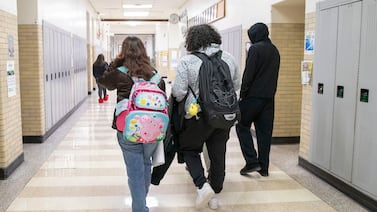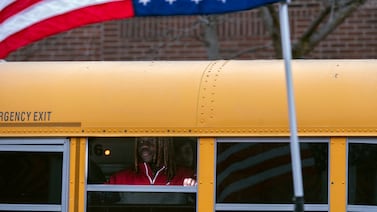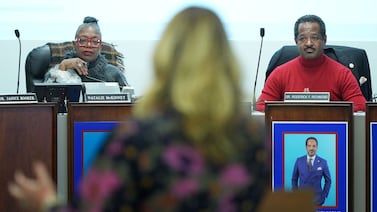Sign up for Chalkbeat Tennessee’s free newsletter to keep up with statewide education policy and Memphis-Shelby County Schools.
Over 1,500 students in Memphis-Shelby County Schools could lose access to targeted in-school literacy tutoring this year as local nonprofit Literacy Mid-South faces ongoing budget challenges.
The nonprofit’s federal COVID relief funding expired in May, leaving its finances in flux like many other organizations nationwide. And in June, the Memphis-Shelby County school board decided not to include Literacy Mid-South in this year’s budget.
The full impact for MSCS students remains unknown with the start of the school year only days away on Aug. 4. Memphis-Shelby County board members still haven’t responded to the nonprofit’s revised proposal in which Literacy Mid-South would tutor 500 students for a fraction of the original price, CEO John Nichols told Chalkbeat.
It’s been over a month since Nichols made that offer.
“While we are not actively partnering with Memphis-Shelby County Schools … at this time, we remain deeply committed to supporting student learning across the region and are continuing to explore ways to collaborate in the future,” Nichols said in a statement Thursday.
Since 2022, Literacy Mid-South has provided tutoring for MSCS students during school hours using $9.6 million of pandemic relief funding.
It’s unclear whether MSCS offers or will offer any other tutoring programs during the school day. District officials did not respond to multiple requests for comment.
In May, the school board requested nearly $40 million in one-time investments from the Shelby County Commission for the upcoming school year, which included $2.2 million for Literacy Mid-South. Board member Natalie McKinney said the commission only gave them $5 million from that request for school safety upgrades.
In an interview with Chalkbeat earlier in July, Nichols said the in-school schedule allows Literacy Mid-South to reach more students. Just over 29% of MSCS elementary students passed state reading tests last year, meaning the majority are required by Tennessee law to be either held back or receive additional academic support.
“There are so many factors at play with before and after school tutoring,” he said. “Transportation is a huge issue for our students, as well as after school activities and parental schedules. You’re guaranteed protected academic time with this model.”
This past year, Literacy Mid-South partnered with 18 MSCS schools to serve around 1,700 elementary students. Nichols said he originally requested $2.5 million from the school board in January for the 2025-26 school year to maintain that level of involvement, with federal money no longer available.
But district officials have said that ask is unreasonable. Board Member Natalie McKinney told Chalkbeat in early July that she didn’t support the nonprofit’s initial proposal in June because she wants more data showing Literacy Mid-South’s model is “best practice” for improving student outcomes.
“If this is the best practice, then we should be utilizing it in a way that is sustainable,” McKinney told Chalkbeat. “What we cannot do is say that we’re going to spend $2 million on 1,000 students. I don’t know how to justify that.”
But before those comments, Nichols had already come back to the board in late June with a request for $650,000 to tutor 500 students. He was hoping for an answer before training for this year’s tutors starts in mid-August. Tutoring services usually begin in September.
Last year, the nonprofit reported that its students improved their scores from fall to winter by an average of 5.9 percentage points on an online assessment used by the district called iReady. The year before, that figure was 7.5 percentage points from the beginning to end of the school year.
Nichols said he recognizes the need for a more robust study of the program. The nonprofit secured a federal grant this year to gather that data. But it needs a group of at least 1,000 students to fulfill the terms of the grant.
Nichols said Literacy Mid-South is expanding its partnerships with nearby charter schools to fill the gap. Last year, the nonprofit worked with six local charters. This year, Nichols said, nine charter schools and one public school in Millington fill the group’s roster.
“We’re currently thinking about, is there a way that we could utilize school staff to kind of observe, and offer a ‘train the trainer’ model, to ensure that literacy tutoring is happening in a homegrown way in the district,” he added.
McKinney said she suggested that idea to Nichols as a way to make the partnership with Literacy Mid-South more sustainable.
“We have to invest smartly,” she told Chalkbeat on Aug. 1. “This could be a pathway to a teacher pipeline.”
Even if Literacy Mid-South eventually secures funding from MSCS, Nichols said he worries about the “loss of momentum” in reading progress for the students Literacy Mid-South wouldn’t reach in its more-limited tutoring plan.
“I also think one of the value-adds of our program is that it did free up capacity for teachers,” he said. “It really helped elevate and strengthen what was happening in their classrooms.”
A previous version of this story mentioned a school board vote on Literacy Mid-South’s budget request. On Aug. 1, board member Natalie McKinney told Chalkbeat there had been no vote, only discussions about the proposal. The story has also been updated to include additional comments from McKinney about the “train the trainer” model and the Shelby County Commission.
Bri Hatch covers Memphis-Shelby County Schools for Chalkbeat Tennessee. Reach Bri at bhatch@chalkbeat.org.






